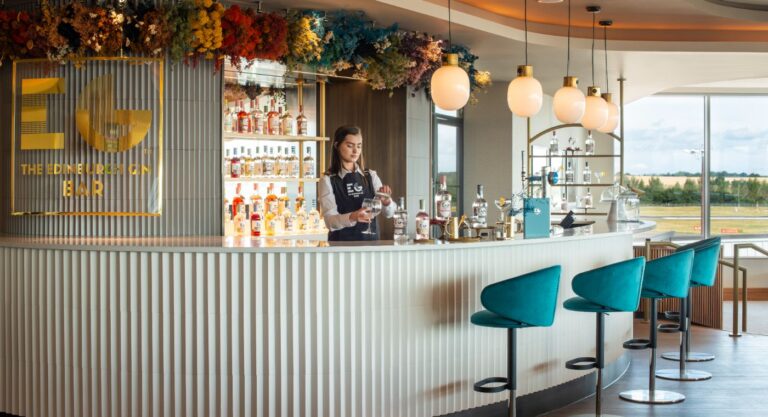At Passenger Terminal Conference 2024 in Frankfurt, Germany, in April, Jonathan Song, global director of business development of Plaza Premium Group (PPG), will give a presentation titled ‘The synergy of airport retail and hospitality: capitalizing on non-aeronautical revenue’. PTT sits down with Song to find out more in the lead-up to the event.
What is your presentation about?
I plan to explore the strategies on how different players in the airport community, including airport authorities, retail brands and hospitality services providers, can collaborate to drive the growth of the airport economy.
We will showcase examples that demonstrate the successful integration of brands and hospitality experiences, highlighting how these maximize revenue and increase brand exposure. We will also discuss how lounge operators can seamlessly integrate in-lounge shopping services with loyalty programs, ultimately enhancing customer engagement and building loyalty.
What are the top three challenges when it comes to integrating an airport’s retail and hospitality offerings? How can these be overcome?
As passengers have varied preferences and needs and each person also travels for different purposes, there is no one-size-fits-all approach when it comes to passenger experience. It’s clear that we will need to create tailored experiences that strategically target specific travel triggers.
Adapting retail and hospitality offerings to specific markets can present challenges due to various factors, including flight operations patterns, cultures, religions, spending power and population demographics. As an illustration, PPG operates in more than 80 airports spanning 30 countries, necessitating a deep understanding of local market dynamics and consumer behavior in order to tailor the product mix to each market or country effectively.
Another challenge is creating mutually beneficial solutions that simultaneously boost revenue for airports and their tenants while enhancing customer experiences, fostering loyalty and maximizing value for both passengers and airport business stakeholders. By aligning the interests of all stakeholders, airports can strengthen their value propositions that drive revenue growth while consistently delivering exceptional customer experiences.
What are the most effective ways to boost an airport’s retail revenues?
Forming synergistic partnerships that leverage and tap into each other’s customer base to cross-sell or cross-promote can be a highly effective strategy in boosting airport retail revenues. By fostering collaboration between airports, retail brands and hospitality service providers, we can co-create unique experiences. This approach will enhance the overall customer experience and drive revenue growth within the retail environment.

It can also lead to the development of innovative commercial models, enabling airports to optimize monetization. One effective approach is to blend retail, F&B and advertising. It maximizes the potential for cross-selling, upselling and targeted advertising, which ultimately leads to increased retail revenues and a thriving airport marketplace.
Another effective way is to streamline services through technology to create an end-to-end experience. PPG has developed a unified marketplace system that seamlessly connects the demand and supply sides of the entire airport business ecosystem on one platform. This solution enhances efficiency on both sides through the centralization of services, enabling airports to optimize retail operations and improve customer experiences.
How has PPG looked to develop its global business over the past year and what are your plans for the future?
In the past year, as the world moved away from Covid-19 and travel made a comeback, we made sure that we were well prepared to meet the needs of travelers.
PPG focused on expanding within the busiest airport routes and top 100 busiest airports, for example –HKG to TPE, SIN to KUL, DXB to BLR, RUH to DXB, and JFK to LHR. We strive to deliver an end-to-end airport hospitality journey, taking care of passengers from departure to transit, arrival and return.
In the above airports, we are rolling out our full suite of airport hospitality services and facilities, including airport lounges, airport in-terminal hotel, airport concierge services and airport dining concepts. We recently opened Intervals, an airport cocktail bar right at the air bridge of the Hong Kong International Airport. We have also forged new partnerships to broaden our service offerings and reach a wider customer base.
From humble beginnings to 25 years of serving passengers around the globe, our future growth will revolve around technology, sustainability and people. Ultimately, these focus areas will underpin our mission of making travel better.
Through investments in technology – like Smart Traveller (Global Travel Membership Program) and OneTECO – we are strengthening our offerings by digitalizing the airport journey. And as the company grows, we will continue to invest in people and to cultivate a more diverse culture. We will also strengthen our focus on business sustainability and ESG. By integrating ESG practices throughout our business operations and actively working with the airport community, we want to achieve net-zero emissions and create a more sustainable future of travel.
What will the audience take away from your presentation?
I hope the audience will learn that there need not be a conflict between travel retail and airport hospitality. In the past, people assumed that those who entered lounges do not spend time shopping. We want to debunk that myth and highlight the synergies between both airport hospitality and travel retail to drive non-aeronautical revenue and enhance airport passenger experience. It presents significant opportunities for growth and monetization. I will also share our own experience of optimizing cross-selling and product bundling to generate revenue.
To hear more valuable industry insights from top aviation executives, book a conference pass for Passenger Terminal Conference, April 16-18, 2024, in Frankfurt, Germany.

